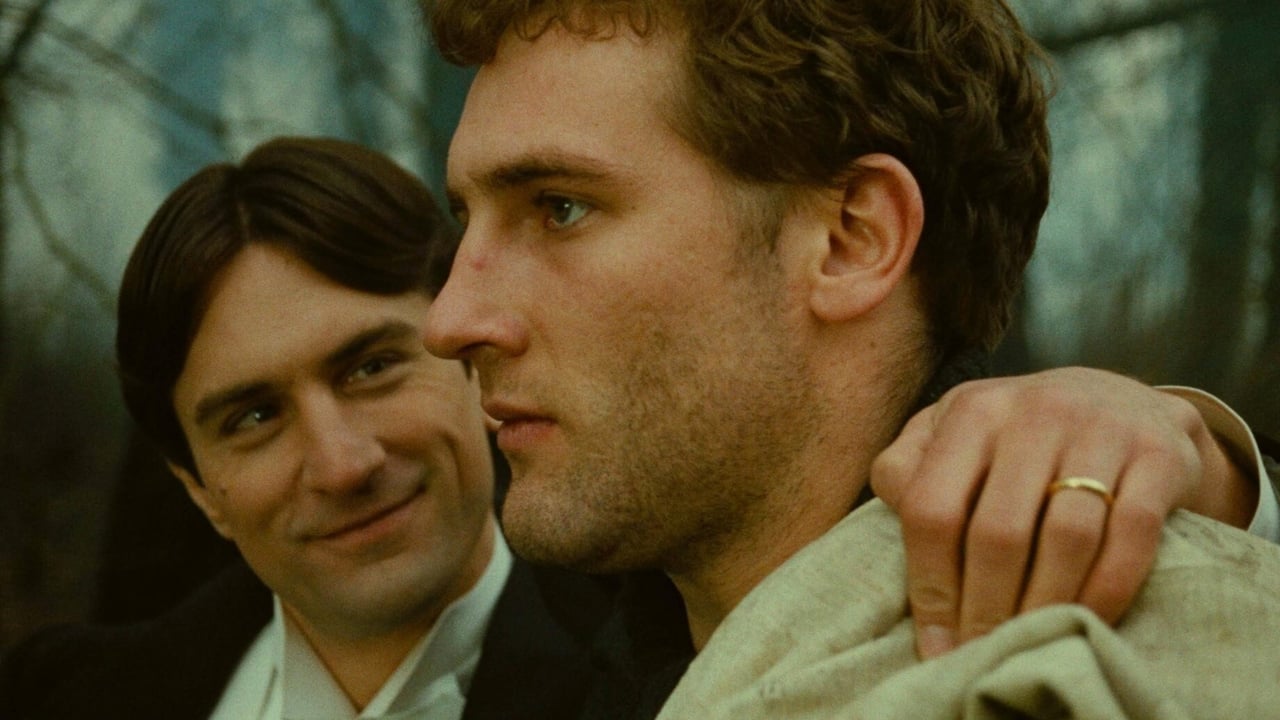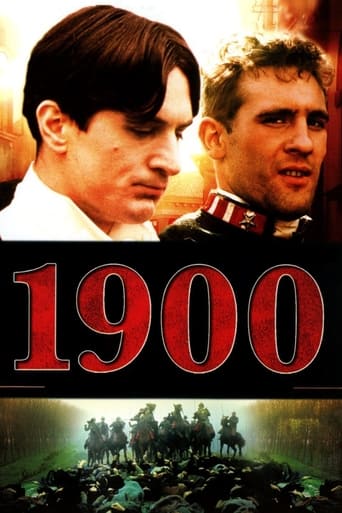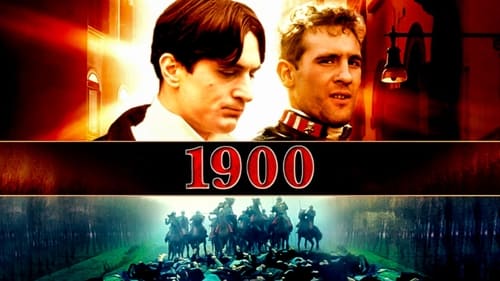



Very well executed
The greatest movie ever made..!
Purely Joyful Movie!
Story: It's very simple but honestly that is fine.
Set in Italy, the film follows the lives and interactions of two boys/men, one born of peasant stock (Depardieu), the other born to a land owner (deNiro). The drama spans from 1900 to about 1945, and focuses mainly on the rise of Fascism and the peasants' eventual reaction by supporting Communism, and how these events shape the destinies of the two main characters.This film excels as an epic, and must be commended for catching Robert DeNiro early enough in his career that he was able to sneak away for what could be called an art film, and then have nobody in America even notice that he did it.But also, that wonk scene... DeNiro and Depardieu? Forty years later, how do you live that down? They have both become huge stars, and Stefania Cassini has her own following, thanks in part to her role in "Suspiria".
View MoreWhat a shame; I had such high hopes for this film. With a cast and budget of fantastic proportions it seems the director was overwhelmed. I love epic tales of conflict and victory that I can lose myself in and become part of the story. Unfortunately this movie never develops any character to care about, there is a confusing collage of scenes some of which are breathtakingly beautiful, just no cohesion. There have been films that I didn't want to end The Godfather, The Deer Hunter, Band of Brothers. This became a bloated rambling mess that I struggled to finish. It seemed the director struggled as well never developing a storyline that could engage me and ending without ever making a statement. What a shame
View MoreIt is gratifying to see that this film is finally receiving the recognition it deserves. The United States market never understood this film. First put off on the length distributors cut and slashed the film to a length they thought movie-goers would tolerate and produced an inferior product that made no sense. The movie-goers themselves were not of a mind-set to appreciate the themes and content of the film. It was released during the height of the disco period when the movie-going public wanted to see Saturday Night Fever and not a politically charged film. There would have been a different result if the film had been released ten years earlier, but even that possibility is doubtful. The film is unabashedly leftist and proudly exposes the virtues of Marxism, so much so it has been called the Marxist Gone With the Wind. Finally, the historical issues portrayed in the film, while familiar to European watchers, are totally unknown to American movie-goers, who never had much interest in history anyway. Still, with all of these drawbacks, its was on its release and remains widely popular in just about every other country in the world and a film of incredible beauty. I watched the 2-DVD release years after first viewing this movie in Europe when it was first released. Little did I know I was watching the European uncut, five hour plus, version, which was not available in the United States. The 2-dvd version loses little of the effect and Bertolucci does not hide his political sympathies. Some may believe that the political message detracts from the film. Far from it. Its message is more relevant today than when it was first released. Burt Lancaster and Robert de Niro took reduced fees for acting in the movie, they believed in the vision so much. De Niro made this movie immediately following Godfather II and could have demanded a higher fee, but didn't.Other reviews have taken exception to the candid depictions to the coming of age scenes, and the scenes depicting the killing of animals. While this may offend PETA sensibilities, and as difficult it is to see the slaughtering of the pig --- or any animal --- there was a point to this part of the movie. One of the purposes of this movie, Bertolucci says in the bonus features, is to remind modern day Italians where they came from. He states that the Italian viewer watching this film in the 70's was only one or two generations away from the lifestyle reflected in the movie. It is faithfully recording everyday life of Italian peasantry, a practice which lives on today in villages in Southern Europe. Nothing was wasted because they could not afford to waste anything.Folks, this is not post-modern urban life in America. American viewers in the early stages of the 21st Century may be farther removed from the practice of slaughtering livestock and scrounging for a meager existence, but as the day laborers in 1990 lived, but I can assure you that there was a day when that was precisely how Americans lived. It is how people lived their lives, until very recently, for hundreds and hundreds of years.American viewers should be more disturbed on seeing how fascism took hold in pre-WWII Italy. It is a reminder how it can happen, here or anywhere, but, ... "It Can't Happen Here" ....As difficult as these scenes are to watch, Bertolucci's 1900 is actually a rather accurate reflection of political trends in Southern Europe in general, and Pre- and Mid-WWII Italy and Greece in particular, and an accurate depiction of post WWI Italy.A particularly accurate account is the scene late in the movie, when, after the war and after the trial of Berlingheri, partisans come moving in, notifying the mob that a new government was installed, and requested everyone turn in their firearms, which they did. Roughly the same post-WWII events occurred in Greece.Whatever one may be the political predispositions of anyone viewing 1900, Bertolucci has created a film of great and exquisite beauty, with a powerful message as relevant today as when it was released. Every frame is suitable for framing, and matches the magnificent the oil painting which opens the film.
View MoreI knew that this was listed in the book 1001 Movies You Must See Before You Die, I didn't realise however it was going to be so long, so I watched it as soon as I could so not to risk dozing off, from director Bernardo Bertolucci (Little Buddha, Stealing Beauty). Basically this film follows the life of two men born in the same year, 1900, the beginning of the 20th Century, in Italy, and sees their life going through the years up to 1945. Olmo Dalcò (Gérard Depardieu) was born a bastard of peasant stock with his grandfather Leo (The Asphalt Jungle's Sterling Hayden), Alfredo Berlinghieri (Robert De Niro) was born in a family of landowners with abusive but populist grandfather, also named Alfredo (Burt Lancaster). Despite the social differences, Olmo and Alfredo become childhood friends, Olmo growing to enlist for the army in World War I, Alfredo learning about the landowning business, and their friendship continues when brought together again. Fascism is becoming rife in many people, including sadistic hired foreman Attila Mellanchini (Donald Sutherland), who tortures and kills animals and people, but don't worry, he gets what he deserves eventually. The 1920's begin, and both the men get married, Alfredo to gorgeous Ada Fiastri Paulhan (Dominique Sanda) who develops alcoholism, and Olmo to Anita (Anna Henkel) who dies during childbirth. Of course World War II begins as the 1940's come along, and the two friends in the older age seem to have parted their ways, and brought back together they do not see eye to eye, and in the end Olmo witnesses Alfredo killing himself. Also starring Stefania Sandrelli as Anita Foschi, Alida Valli as Signora Pioppi and Laura Betti as Regina. Both De Niro and Depardieu give credible leading performances, Sutherland is extraordinary as the evil character, and Lancaster gets his time too, there are certainly some eye catching moments and memorable scenes, despite it being five hours and seventeen minutes long, it is I suppose worth it, a most watchable epic period drama. Very good!
View More